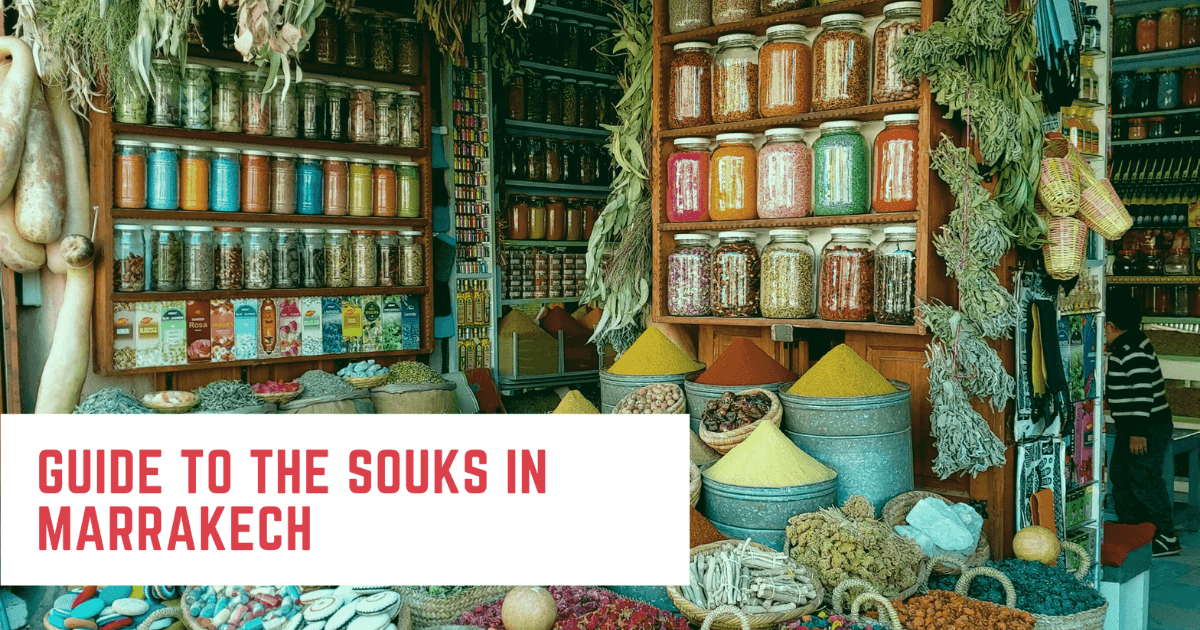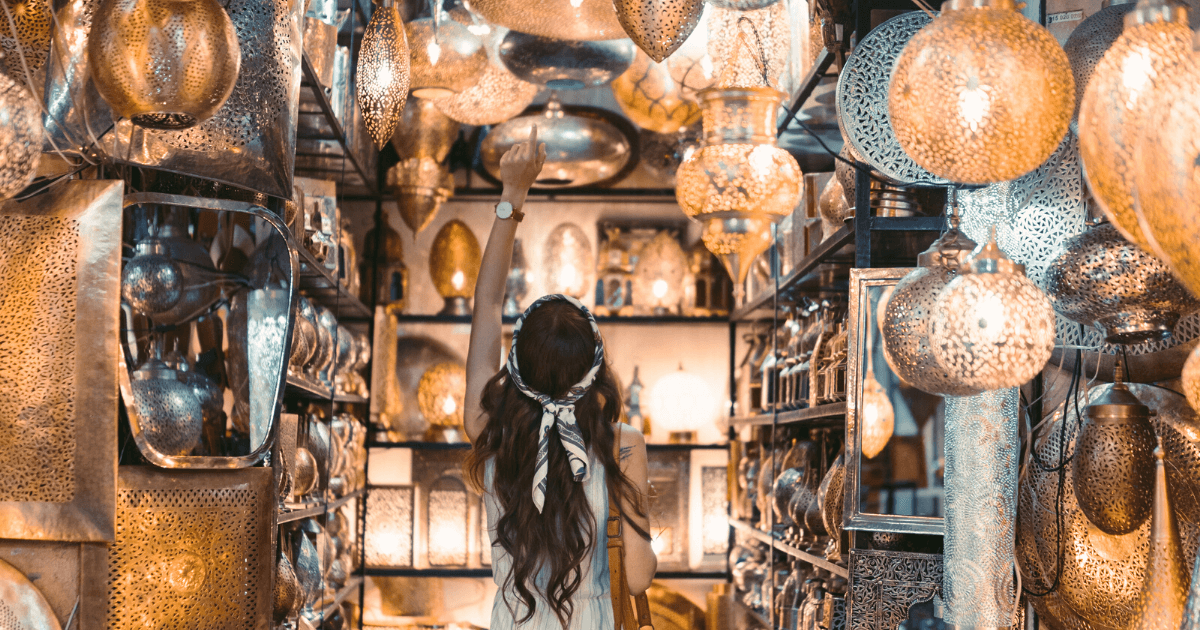
Marrakech Souks Guide, Prices, opening hours, and Shopping Tips
The term souks mean simply markets, and it is an unmissable attraction even if you’re not into shopping, the souks are still a site that’s well worth experiencing. the unique and chaotic atmosphere, the haggle, the smell of spices, the magic light lamps, traditional clothes, fabric, and street food. The souks add them to unique travel experiences in Morocco’s red city.
The early history of souks in Marrakech
Historically, souks in Morocco operated weekly outside cities, where merchants arrived on caravans to sell goods. Smaller villages and towns still host these markets regularly. Each region rotates souk days; for example, Ourika Valley’s souk is every Monday, and Asni’s is on Saturdays. In larger cities like Marrakech, Casablanca, Fes, Essaouira, and Tangier, souks are bustling daily market districts occupying entire street blocks. Marrakech’s souks, strategically positioned on vital trading routes, drew merchants from all directions, facilitating trade in goods from Morocco, neighboring African countries, and beyond.
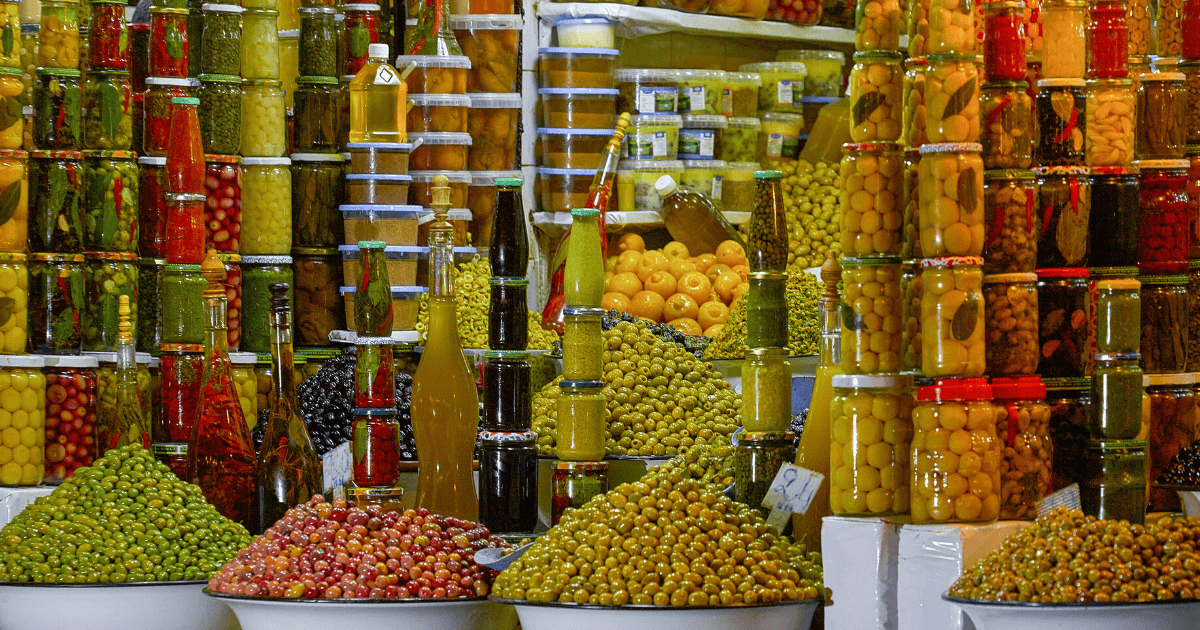
The various souks in Marrakech
- Tannery Souk: Find everything for tanning, including surprising items like pigeon droppings! Despite its distinctive aroma, it’s an ideal place to witness the six steps of tanning, from skin arrival to leather dyeing. Visit in the early morning for the best views from local shop terraces overlooking the tanneries.
- 2Souk Semata: Known as the Babouch Souk, this impressive alley thrives with countless merchants selling colored leather slippers. In Marrakech, these slippers are a popular gift among locals for friends and relatives.
- Tailors’ Souk: Craftsmen skillfully work yellow and red copper here.
- Souk Semmarine: Located next to Jemaa al-Fnaa, Marrakech’s main square, this market is the largest and most popular. Explore stalls selling authentic bags, shoes, clothes, colorful textiles, lamps, pottery, brass, belts, and other traditional products manufactured onsite for centuries.
- Souk Kassabine: Rahba Kédima and spices market.
- Souk Haddadine: Blacksmith market where craftsmen shape metal into elegant wrought iron grids, beds, tables, chairs, and everyday objects amid sparks and hammer sounds.
- 7. Souk Cherratines: Saddler market offering leather goods like bags, purses, and wallets.
- Souk Ahiak: Fabrics and clothing market.
- Souk Chouari: Basket maker and woodturner market featuring wooden objects, small furniture, board games, and more, often painted in vibrant colors.
- Souk Dlala: Djellabas auction market.
- Souk Zrabi: The carpet souk.
- Souk of the Bijoutiers: The jewelers’ souk.
- Souk Ableuh: The herbs and spice souk.
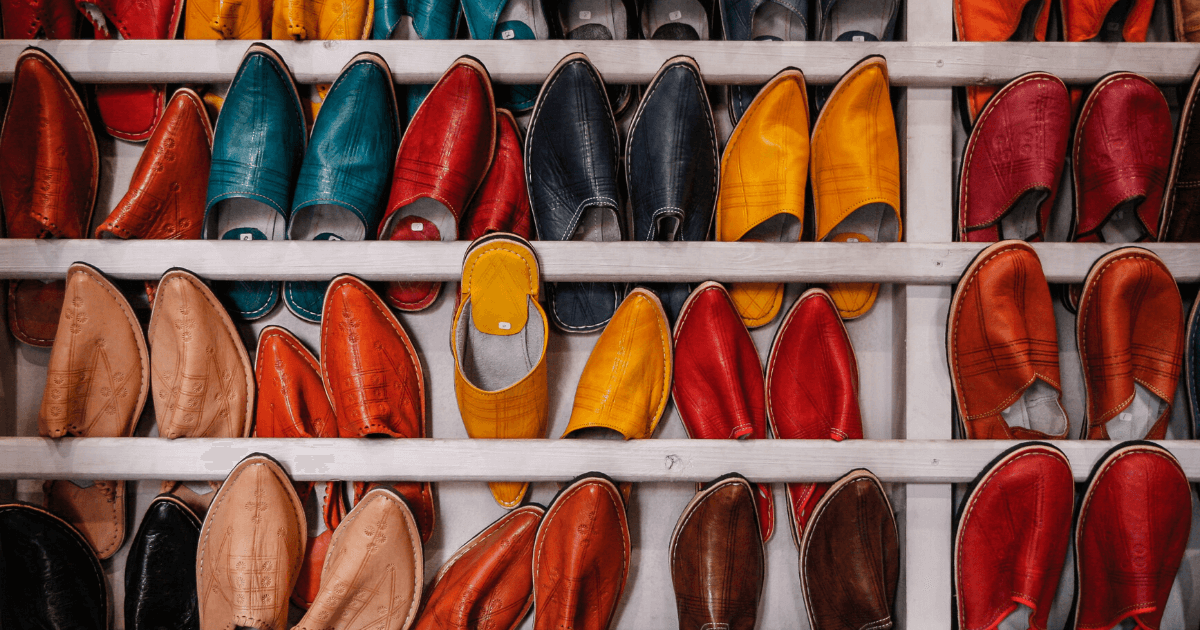
Souks Marrakech opening times
The opening hours of Marrakech’s main souk off the square vary by shop owners. Generally, things start slowly in the morning, but by 10:00 AM, most shops are open. Closing begins around 7:30 PM, with the main souk gates closing by 8:30 PM for the night. Shops closer to the square stay open until the food stalls close around 11:30 PM.
Navigating Marrakech Souks with Ease
If you’re not close to Djemaa el-Fna, finding your way through Marrakech’s bustling souks can be daunting. The narrow, covered alleyways teeming with goods can easily confuse.
Simplify Your Exploration
Opt for a licensed guide or tour to navigate confidently, especially if time is limited. Alternatively, use a detailed souk map or offline Google Maps to explore independently. Highlight key souks and main routes beforehand for a smoother experience.
Keep Orientation Simple
Look for directional signs and landmarks like the Koutoubia Mosque, a short walk from Djemaa el-Fna, to guide you back if you lose your way in the labyrinthine souks.
Relax and Refresh on a Rooftop
Amidst the souks’ hustle, take a break at a rooftop café. Places like Café France, Le Grand Balcon du Café Glacier, and Café des Épices offer serene views and a perfect spot to enjoy mint tea while soaking in the vibrant street scenes below.
.
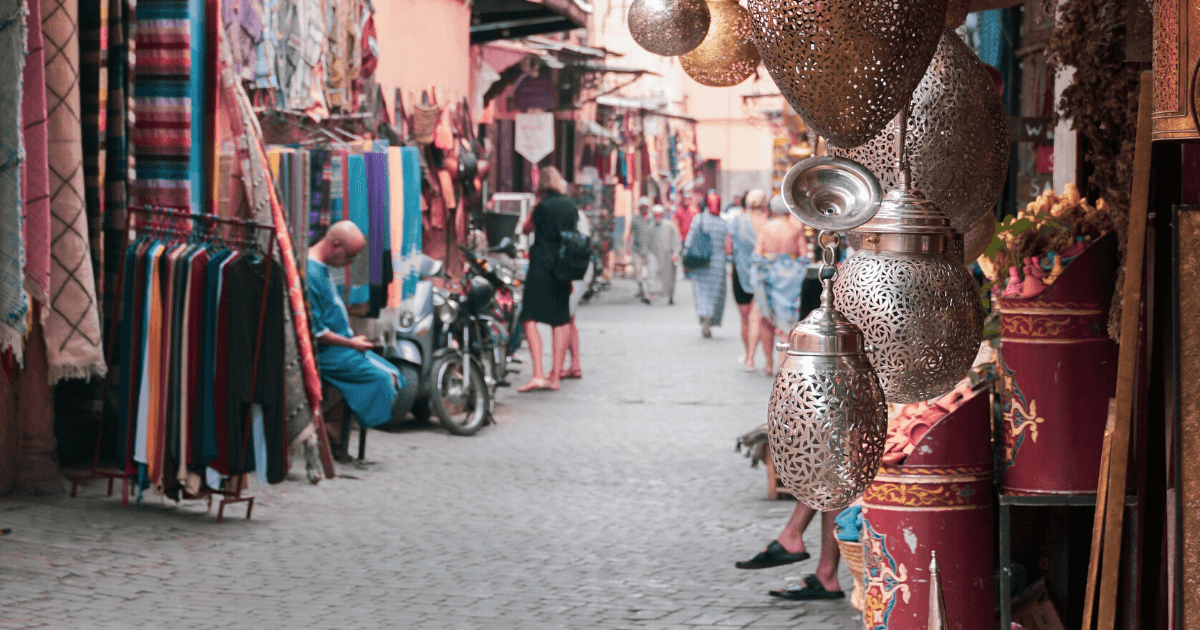
Learn to haggle
In Morocco, while bargaining is common in the souk, shops typically maintain fixed prices. This cultural contrast allows visitors to experience different purchasing dynamics based on their shopping preferences.
Personally, when shopping in souks like Egypt’s Khan el-Khalili bazaar or Istanbul’s Grand Bazaar, I have a method: I don’t purchase anything on my first visit. Instead, I stroll around, observe closely, and inquire about the same item from various shops to gauge the baseline price.
- Only offer what the item is worth to you.
- Don!t be too interested.
- Walk away if what you feel the item is worth to you. You will often be chased after you leave.
- Do not use any percentage of the offering price.
- Look closely at the item and point out any defects. handmade, good quality items are in good shape and they have plenty of details.
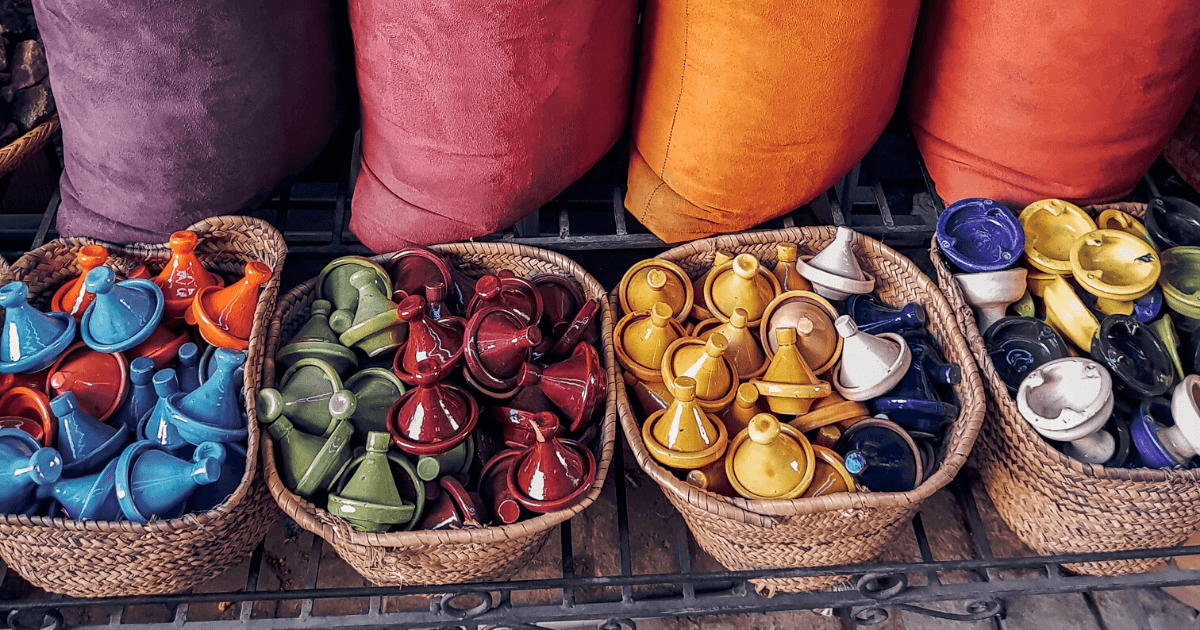
Ensemble Artisanal shopping at fixed prices in a relaxing atmosphere
The Ensemble Artisanal (Handicraft Centre) in Marrakech is a government-sponsored complex of artisan workshops. Here, artisans not only teach their trade to apprentices but also sell their creations directly to consumers at fixed, reasonable prices.
Although the small shops in Ensemble Artisanal offer fewer goods compared to the souks, you can comfortably assess prices and quality in a relaxed atmosphere without constant engagement in sales pitches.
APPROXIMATE PRICE GUIDE FOR GOODS
Marrakech souk price guide
Here are some of the things to buy in Marrakech and the approximate prices for goods (in Moroccan Dirhams).
- Lamps: 30 DH each
- Olives: 30 DH for a big tub, 10 DH for a small one
- Harem trousers: 100 DH
- A handloom cloth bag: 120 DH
- Argan oil: 150 DH medium size bottle
- Head turban: 70 DH
- Mojris/babouches [local ballerinas] : 70 – 100 DH
- Abaya/Djellaba (traditional Moroccan women’s attire): 100 DH- 300 DH depending on the quality.
- Scarves : 20DH – 70DH each
- Tagine : 20DH-50DH depending on size
- Spices: The price varies from spices between 30DH and 60 DH per kilo, turmeric, cumin, ras el hanout (mixture “hide misery” as some call it) are among the least expensive.
- Black soap: About 30 DH half a kilo in a plastic bag (more expensive in a waterproof plastic box).
- Almonds, walnuts: 80-120 DH per Kg depending on the quality. Dates can be negotiated cheaper.
- Verbena: 100 DH per kg.
- Shisha: From 150 DH for the little ones. Tobacco for shisha: 20 DH.
- Woven hat: Between 10 and 15 DH.
- Small pottery (for tapas, ashtray …): 20 DH if it fits in your hand. 30-40DH if a little larger.
- Small wooden toys: Between 10 and 20 DH.
- Small new teapot: 90-100 DH, cheaper if used.
